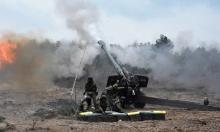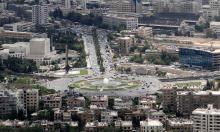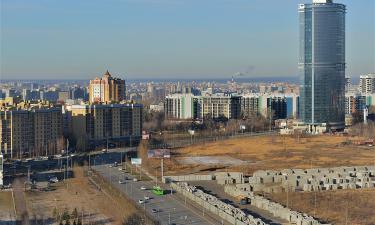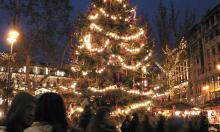Bolivia: Evo Morales wishes Hugo Chávez speedy recovery
Similar to Venezuela, in Bolivia the president must render an account of his work in the previous year to the country's National Assembly, which is called Plurinational Assembly. The state is the Plurinational State of Bolivia, "Bulivy Mamallapta" in Quechua and "Wuliwya Suyu" in Aymara, due to its large number of different ethnic groups, cultures and languages.
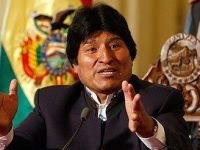
by Olivia Kroth
Sources: Correo del Orinoco, Patria Grande, Telesur
The Bolivian President, Evo Morales, took this opportunity to inform the deputies about his telephone call to La Havana, where he received good news about Hugo Chávez' recovery. Evo Morales praised his Venezuelan colleague for the liberation of Venezuela and the whole Latin American continent.
"Fidel (Castro) and Hugo (Chávez) have our respect and admiration, because they are the leaders of Patria Grande, the great fatherland," which comprises the Caribbean region, Central and South America.
Evo Morales told the Bolivian Plurinational Assembly that Hugo Chávez is in physiotherapy after his recent cancer operation in Cuba, hoping to be able to return to Venezuela in the near future.
Besides rendering his account for 2012 to the Assembly, Evo Morales also celebrated the third anniversary of the Plurinational State of Bolivia and the seventh year of his presidency.
When he became president in 2006, Bolivia's international money reserves stood at 1.7 billion USD. Today, they are more than 14 billion USD, due to the nationalization of strategic hydrocarbon assets.
All foreign energy firms had to sign new contracts, giving Bolivia the majority ownership and 82 percent of revenues for the large Bolivian gas fields. Evo Morales knows that his country's hydrocarbon reserves are very valuable, just like the lithium and tin reserves.
Bolivia's top export goods are hydrocarbons (45 percent), minerals (27 percent), manufactured goods (24 percent) and agricultural products (4 percent). The main trading partners are Argentina, Brazil, China and Venezuela.
In 2009, Evo Morales was re-elected for a second presidential term with 64.22 percent of all votes. His party, Movement for Socialism (MAS), won a two-thirds majority in both houses of the National Congress. MAS and President Morales have a broad base in Bolivia's indigenous communities. He is the first indigenous president of the country, with Quechua roots.
About 2.5 million of Bolivia's population are Quechuas, two million are Aymaras, followed by 180.000 Chiquitanos and 125.000 Guaraníes. All in all, the Amerindian percentage is 55 percent, more than half of the state's inhabitants. The remaining minorities are 30 percent mestizos and 15 percent whites.
The Aymaras and Quechuas live in the Andes. Most of the Aymara communities are located on the high plateau of La Paz, Oruro and Potosí, while the Quechuas inhabit the valleys of Cochabamba and Chuquisaca. In the warm eastern part of Bolivia, the Oriental Llanos, the Guaraniés, Tacanos, Panos, Aruacos, Chapacuros, Botocudos and Zamucos can be found.
During the seven years of Evo Morales' presidency, poverty was reduced by 60.5 percent. About one million Bolivian citizens belong to the middle class today. The President pointed out in his report that more people were employed in the sectors of education and health. Less pupils dropped out of school, the dropout rate was reduced from 6.1 percent at the beginning of his mandate in 2006 to 2.0 percent in 2012.
"We are a dignified nation," Evo Morales said in his speech at the Plurinational Assembly, affirming that he will not allow his people to be "blackmailed by imperialists," but will continue to build exterior relations "with all of the world," based on "mutual respect."
He reminded the deputies of the times in 2006, when the US ambassador in La Paz dared telling him not to deepen his relations with Cuba and Venezuela. In 2008, the US embassy in La Paz was closed and the ambassador expelled from Bolivia, because of conspiring with right wing fascists, with the aim of destabilizing the country.
Telesur was invited to the Plurinational Assembly and filmed the event. Evo Morales presented his annual report for 2012 in great detail. The presentation began at 10 in the morning and lasted for two hours. The President included a multitude of statistical data about the economic increase in various sectors, which is his forte. He likes giving the people good news.
In the afternoon, large crowds gathered in La Paz for a fiesta to celebrate the third anniversary of the "Estado Plurinacional," created by Evo Morales, giving equal rights to all Bolivian citizens.
On the Plaza Murillo, delegations of farmers and social movements from all over Bolivia came together to watch the parade of the Armed Forces. Telesur interviewed some people, for example, Carmelo Titirico, head of a farmers' association. He said that the indigenous people expected many projects for the rural areas. Gustavo Alliaga, director of "Colonizadores Interculturales," noted that there was a lot to celebrate, especially some new laws of far-reaching importance.
Bolivia's Vice-President, Álvaro García Linera, confirmed that President Evo Morales will take part in the CELAC Summit in Santiago de Chile, from the 26th to the 28th of January 2013. "As always, our President will defend the integration process of our continent," he emphasized. Evo Morales is a strong believer in his country's motto, "La union es la fuerza." Unity is strength.
For Venezuela, Vice-President Elías Jaua will travel to Chile. All in all, 33 CELAC countries will participate in the summit, where delegates from the European Union are expected as well. Hopefully, this CELAC gathering will bring some positive results for both continents, Europe and Latin America.
Prepared for publication by:
Lisa Karpova
Pravda.Ru
Subscribe to Pravda.Ru Telegram channel, Facebook, RSS!
